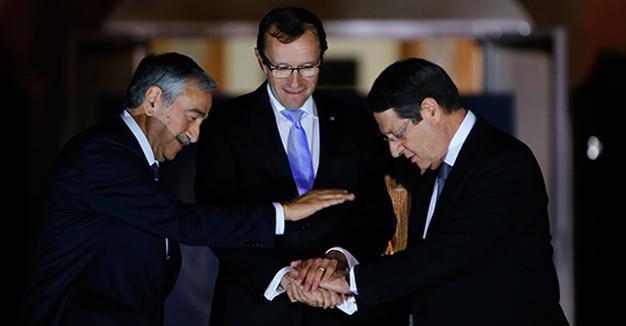Turkish could become official EU language through Greek Cyprus’ efforts
NICOSIA/DAVOS

In this Monday, May 11, 2015 file photo, Greek Cyprus' President Nicos Anastasiades, right, Turkish Cypriot leader Mustafa Akıncı, left, and United Nations envoy Espen Barth Eide shake hands after a dinner at the Ledra Palace Hotel inside the UN controlled buffer zone that divides the Cypriot capital Nicosia. AP Photo
Turkish could become an official language of the European Union thanks to the efforts of the Greek Cypriot leader, according to a spokesman for the president of the Turkish Republic of Northern Cyprus.
Nicos Anastasiades has been lobbying for Turkish to be made the EU’s 25th official language ahead of expected reunification with Northern Cyprus, spokesman Barış Burcu said on Jan. 19, two days before the island’s two leaders make a joint appeal to the world’s political and business elite in Davos on Jan. 21.
Burcu described the move as a “late but well-meaning step,” according to Turkey’s state-run Anadolu Agency.
Talks between Anastasiades and Turkish Cypriot President Mustafa Akıncı to produce a peaceful federal state with two autonomous entities have been positive so far and many of those involved have said they expect an agreement on reunifying the island to be made by the end of the year.
“Turkish will be one of the official languages of the prospective united federation, if we come to any agreement,” Burcu said in Nicosia.
The Greek Cypriot administration has been an EU member since 2004. Turkish Cypriots are considered EU citizens, even though they live on territory not under the control of the Greek Cypriot government.
Two leaders to jointly address Davos Anastasiades and Akıncı are scheduled to make an unprecedented joint appeal at a special session titled “Reuniting Cyprus” at the annual World Economic Forum in Davos on Jan. 21.
U.N. and European officials say the prospects of finally reaching a peace deal to resolve one of the oldest frozen conflicts on the planet are better than at any time since Greek Cypriots rejected a U.N. peace plan in 2004.
“While the world is generally not in good shape, for Cyprus the stars are aligned,” said Espen Barth Eide, the Norwegian U.N. special envoy for Cyprus and head of the WEF’s global security program.
“There’s an interest among the leaders involved. Both Turkey and Greece see advantages to moving on,” Eide told Reuters.
The eastern Mediterranean island has been divided since Turkey invaded the north in 1974 in response to a short-lived coup in Nicosia inspired by Greece’s then military rulers.
The two leaders of the island and U.N. chief Ban Ki-moon are also scheduled to meet on the sidelines in Davos on Jan. 21 to push forward the peace process, according to a statement issued from U.N. spokesperson’s office released on Jan. 14.
The meeting was stated to be held “in order to take stock of the state-of-play in the negotiations.”
Eide will also attend the meeting, the statement added.
Peace efforts gained a boost in 2015 with the election of two leaders who are personally committed to a negotiated settlement, as well as the discovery of large offshore natural gas deposits off Cyprus which would be easier to exploit if there is a deal.
A reunited Cyprus would also need international investment to help the peace process work. Reconstructing one resort town abandoned in the conflict is estimated to cost billions of euros, and compensation may also be required for people unable to reclaim their properties.
Turkish Prime Minister Ahmet Davutoğlu is due to address the Davos audience right after the Cypriot leaders and is likely to reaffirm his country’s commitment to support a settlement this year, which would also remove an obstacle to closer EU ties.
Some diplomats in Ankara hope for agreement on the text of a deal before Cypriot parliamentary elections in May, and a referendum soon after that.
